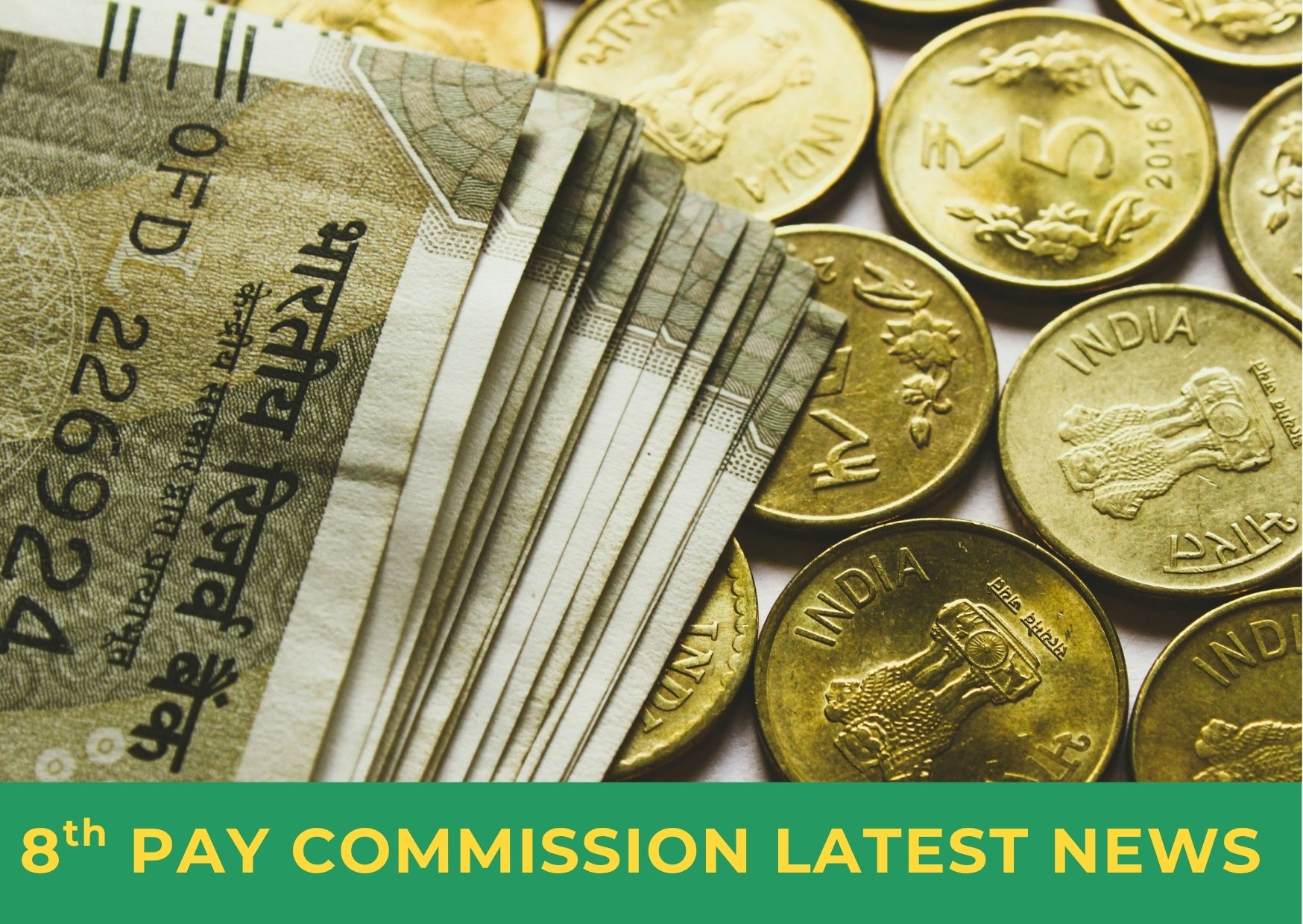
The Union Cabinet, chaired by Prime Minister Narendra Modi, has approved the formation and Terms of Reference (ToR) of the 8th Central Pay Commission (8th CPC) — the body tasked with reviewing and recommending revisions in pay scales, allowances, and pensions for central government employees and pensioners.
The Commission is expected to submit its report within 18 months, paving the way for the next round of pay and pension revisions, likely to take effect from 1 January 2026, in line with the timelines of previous pay commissions.
Composition of the 8th Pay Commission
According to the government notification, the 8th Central Pay Commission will function as a temporary body for 18 months and will consist of three members:
- Justice Ranjana Prakash Desai (Chairperson) – Former Supreme Court Judge, who has previously served as Chairperson of the Electricity Appellate Tribunal, Lokpal Appointment Committee, Delimitation Commission of India, and Press Council of India. She brings immense experience in public policy and judicial administration.
- Professor Pulak Ghosh (Member) – A renowned academician from the Indian Institute of Management (IIM), Bangalore, specialising in finance, data analytics, and economics.
- Shri Pankaj Jain (Member-Secretary) – A senior IAS officer of the 1990 batch, currently serving as Secretary, Ministry of Petroleum & Natural Gas.
The Commission will submit its recommendations within 18 months of its constitution — by approximately April 2027. Based on past patterns, the government is expected to take 3–4 months to examine and implement these recommendations, meaning that new pay and pension scales could be introduced around August 2027, but with retrospective effect from 1 January 2026.
What Are the Terms of Reference (ToR)?
The Terms of Reference define the framework and priorities of the Pay Commission. These terms guide the Commission on what aspects of pay, pension, and service conditions must be studied and how recommendations should be framed.
Interestingly, many of the 8th Pay Commission’s ToR mirror the 7th CPC’s 2014 notification, though one major new clause has been added.
The Commission will review and recommend revisions in:
- Pay structures of all central government employees.
- Pay, allowances, and retirement benefits of Defence Forces personnel.
- Pension, family pension, bonus, and incentives for central government employees.
- The relationship between pay and productivity, and measures to promote efficiency.
- Any other matter referred to it by the government.
The New Addition: ‘Unfunded Cost of Non-Contributory Pension Schemes’
One significant change in the 8th CPC Terms of Reference is a new clause directing the Commission to consider “the unfunded cost of non-contributory pension schemes.”
Let’s understand this in simple terms.
Non-contributory pension refers to pensions for which no deduction is made from an employee’s salary during service — for example, Defence Forces pensioners and civilian employees who joined government service before 1 January 2004 (before the introduction of the New Pension Scheme or National Pension System).
Because these employees never contributed to a pension fund, their pensions are paid directly from the government’s revenue, funded by tax collections. This means such pensions are an unfunded liability — they represent a recurring cost to the government without a dedicated savings pool.
By including this new clause, the government has effectively asked the 8th Pay Commission to keep in mind the fiscal burden of these pensions while recommending pay and pension increases. Analysts interpret this as a sign that pension revisions might be more conservative than salary revisions this time.
In the 7th Pay Commission, both pay and pension were revised by the same fitment factor of 2.57. However, with the new clause, it’s possible that the pension fitment factor could be slightly lower than the pay fitment factor.
Expected Pay and Pension Increase
While the final report is awaited, early estimates and expert opinions suggest the following projections based on inflation trends and economic conditions:
- Expected Pay Fitment Factor: Around 1.85, implying a 13–14% increase in basic pay.
- Expected Pension Fitment Factor: Around 1.80, implying a 10–11% increase in pension.
These are indicative figures based on historical data and fiscal expectations; the final decision will rest with the Pay Commission and subsequent Cabinet approval.
Implementation Date and Arrears
A common question among government employees and pensioners is:
When will the 8th Pay Commission be implemented?
Historically, the implementation date of every Pay Commission has been 1 January of the relevant year, irrespective of when the report is submitted.
- The 6th CPC was implemented in 2008, but benefits were given from 1 January 2006.
- The 7th CPC report came in 2016, but it was made effective from 1 January 2016.
Hence, even though the 8th CPC report will likely be submitted by April 2027, the effective date will still be 1 January 2026.
This means all employees and pensioners will receive arrears for the period between January 2026 and the actual date of implementation.
What About Those Retiring Between January 2026 and Implementation Date?
For employees who retire after 1 January 2026 but before the implementation of the new pay structure, their gratuity, leave encashment, and commutation will initially be calculated on the old pay scales.
However, once the 8th CPC recommendations are approved, they will also be eligible for arrears of retirement benefits as per the revised scales.
A Comparison with 7th Pay Commission
The 7th Pay Commission was constituted 22 months before its implementation date (from 1 January 2016), whereas the 8th CPC has been constituted just 2 months before its due date (1 January 2026).
Although delayed, the formation of the 8th CPC ensures that the government remains committed to regular pay and pension revision cycles, in line with inflation and economic growth.
Another notable similarity is the 18-month timeline given to both the 7th and 8th Commissions for submission of their reports.
Why This Matters
The Pay Commission’s recommendations affect over one crore central employees and pensioners, and indirectly influence pay structures in state governments, public sector undertakings (PSUs), and even private companies.
Each Pay Commission’s report reshapes India’s salary structure, fiscal expenditure, and pension obligations. With the new “unfunded pension” clause, the 8th CPC faces the challenge of balancing employee welfare with fiscal responsibility.
In Conclusion
The approval of the 8th Central Pay Commission marks the beginning of a crucial process that will impact the financial future of millions of government employees and pensioners.
With Justice Ranjana Desai at the helm and an 18-month timeline to deliver recommendations, the focus will now shift to how the Commission balances economic prudence with fair compensation.
While employees eagerly await revised pay and pension structures by early 2027, they can take assurance that arrears from 1 January 2026 will ensure that no one misses out on the benefits.
For now, the 8th Pay Commission’s formation brings renewed hope and anticipation — a step forward in maintaining the dignity and financial well-being of India’s vast government workforce and its veterans.
ALSO READ : COMMON SPARSH-RELATED PROBLEMS AND THEIR COMPREHENSIVE SOLUTIONS






A layman like me does not understand tge logic of not stting the Pay Commission ,2 yrs before its due date of implementation,than paying the arrears.
Payment of arrears involves complications and representations against the amt calculated as arrears.
Further,the I Tax is charged on this amt of arrears,which is substantial,in the year of receipt than spreading the arrears income to the relevant year to which it belongs/due.
Why a Defence member not included in the Pay Commn.
Its a fact that the Defence pensioners constitute a large chunk of pension and in view of the large increases in the pension amt and with the increase in life expectancy,the govt is unable to bear this heavy burden,which is borne by the tax payers.
The logic of pay commn,to offset the inflation,when there is a increase in the DA ,every six months.
If the proposal mooted earlier by the Modi Sarkar,and supported by the first CDS,if the Defence personnel also subject to contributory Pension fund .The govt ,it is believed has plans to replace Defence Pension with a Subsistence Allowance.
Logically also ,why a govt servant does not save enough during service,than to demand pension.
And why after the death of the retiree,to the wife for life ( and now with liberalized pension rules to a hoard of dependents of three generations( parents handicapped children and the dreaded,even to the divorced daughter( a trend and an easy opening to declare divorce on paper,to get the large booty).
Though the Courts have ruled that the pension is a right for the services rendered and is not a charity.
High time the Govt finds an alternative than making Tax Payer pay for the family pensioners,for no work/contribution to the society.Now every body is educated and skilled and nobody dies of hunger.
Thanks for your kind information and time to time serve latest coverage in future also please.
Dear surjitji. Please consider compulsory military service and lifetime reserve period. Our constitution says that Indian republic is a welfare state. You may also suggest to eradicate corruption that has equal and running a parallel economy. That alone actually ruins our country . Jaihind.
Very useful news
Dear brother , there are so many ways to save public money and corruption is one ,illegal mining ,land registration and many more on which Govt. can focus . Country is certainly responsible to lookafter its soldier and their families who give best part of their life to make you sleep comfortably in your cosy bedroom. A soldier never retires , they become veteran and remain at beck n call of the Govt. Of India..I think Country would agree with me.
Jai Hind , Jai Bharat .